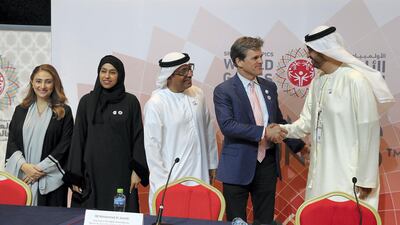As the Special Olympics World Games come to an end, Abu Dhabi officials have pledged more training and support programmes for people with disabilities.
“The legacy continues after closing ceremony and hard work does not stop after these games,” said Tala Al Ramahi, chief strategy officer at World Games Abu Dhabi.
She said Special Olympics UAE will work year-round to provide free sports training for athletes and support programmes for their families.
The UAE’s Special Olympics team was the largest of the Games with athletes competing in all 24 sports - earning a total of 182 medals.
“The future is a bright one for Special Olympics UAE and we will focus on training in the 24 sports,” said Ms Al Ramahi, at the closing press conference on Thursday.
“We want to work with the private sector to ensure that we provide employment opportunities for our athletes.”
She said the committee will continue to provide free health screenings for athletes as part of the Healthy Athletes programme, that ran throughout the Games.
Meanwhile, Dr Sultan Al Jaber, Minister of State and chief executive of Abu Dhabi National Oil Company (Adnoc) Group, said the company will aim to hire more people with disabilities.
He said Adnoc would tailor positions for potential employees to “enhance flexibility for them and their families”.
“We are also committed to introduce a range of programmes through Adnoc Schools that will include specialist training for people of determination,” Dr Al Jaber said.
“My team and I stand very ready to provide whatever support is needed to deliver, together, a very inclusive world.”
Timothy Shriver, chairman of Special Olympics International, said the end of the Games signalled the beginning of a new era in Abu Dhabi.
He praised the UAE’s decision to introduce the Unified Champion programme, that pairs people with and without disabilities to play sports, at all public schools, saying it was the “strongest commitment” any country has made to the Special Olympics.
He said that with that programme “every child grows up learning to be inclusive and tolerant.”
“When national leaders want to know what does it look like [to be inclusive] and how to do it, we want them to come here [to Abu Dhabi],” said Mr Shriver.


